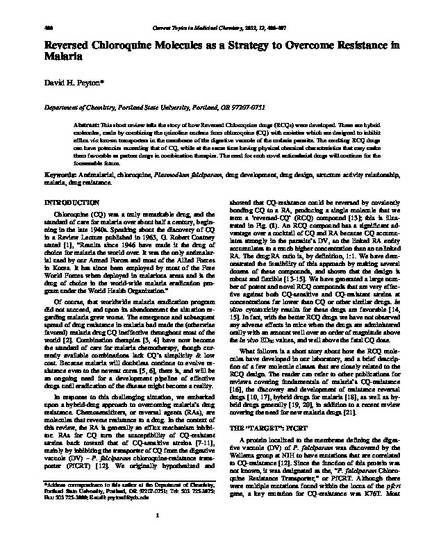
Article
Reversed Chloroquine Molecules as a Strategy to Overcome Resistance in Malaria
Current Topics in Medicinal Chemistry
Sponsor
The author thanks The Medical Research Foundation of Oregon (Grant 0530) and the National Institutes of Health (Grants AI067837, AI072923, and AI090848) for financial support.
Document Type
Article
Publication Date
3-1-2012
Subjects
- Drug design,
- Chloroquine -- Antimalarials,
- Plasmodium falciparum,
- Malaria
Disciplines
Abstract
This short review tells the story of how Reversed Chloroquine drugs (RCQs) were developed. These are hybrid molecules, made by combining the quinoline nucleus from chloroquine (CQ) with moieties which are designed to inhibit efflux via known transporters in the membrane of the digestive vacuole of the malaria parasite. The resulting RCQ drugs can have potencies exceeding that of CQ, while at the same time having physical chemical characteristics that may make them favorable as partner drugs in combination therapies. The need for such novel antimalarial drugs will continue for the foreseeable future.
DOI
10.2174/156802612799362968
Persistent Identifier
http://archives.pdx.edu/ds/psu/9600
Citation Information
Peyton, David H. "Reversed Chloroquine Molecules as a Strategy to Overcome Resistance in Malaria." Current Topics in Medicinal Chemistry 12, no. 5 (2012): 400.

Copyright ? 2012 Bentham Science Publishers. This is a Bentham Open Access Plus article made possible by the Author. The original instance of this article can be found at http://www.benthamscience.com